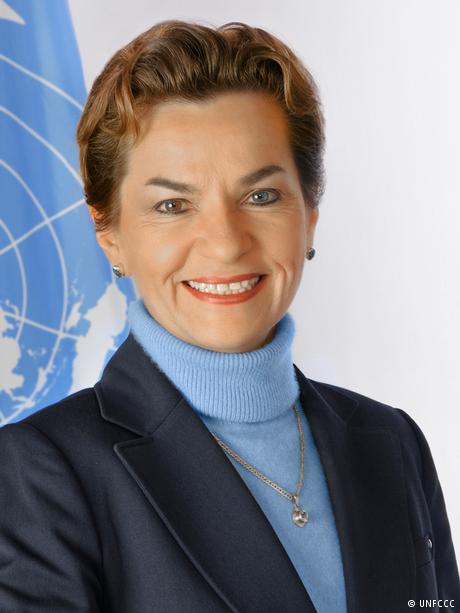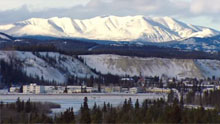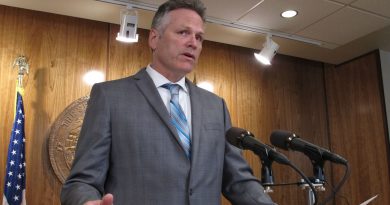Ice-Blog: UN Climate Chief on New York summit
 Your Ice Blogger has been busy with the New York climate summit around the corner.
Your Ice Blogger has been busy with the New York climate summit around the corner.
I was delighted to read that Ban Ki Moon is considering a special Arctic summit and a trip on a Greenpeace Arctic mission vessel after receiving a petition to Save the Arctic. I am also hoping there will be some high-profile promises of climate action. Meanwhile, here in Bonn, I talked to Christiana Figueres, the Executive Secretary of the UNFCCC (Climate Secretariat), which is based here in Bonn, just next door to my Deutsche Welle Office, before she left for New York.

She told me what she expects of this meeting, which is something different from the regular UN climate summits. She also told me why she was joining yesterday’s climate march.
Excerpts from my interview with Christiana Figueres:
Ice Blogger: Why do we need yet another climate summit? The conferences we organize once a year have the purpose of moving towards a legally based agreement, scheduled to be adopted in Paris next year. In New York, nothing is going to be negotiated. It’s very much an attempt to blow wind into the sails of the formal process. It’s about raising political will and public awareness. It is a powerful opportunity for the leaders of countries and corporations to come forward and say what each of them is going to do. UN Secretary-General Ban Ki-moon has asked these leaders to bring bold announcements and actions to the summit. What do you expect to come out of it? We will have a host of announcements from governments about what they are already doing and will undertake with respect to bringing down their own emissions and increasing the resilience that they need to incorporate into their planning and their infrastructure to deal with the variability and the vulnerability of climate change. From the private sector we expect the same: announcements as to how they are going to contribute to reduce emissions, either in their own operations or, even more interestingly, how they are going to be shifting their capital into low-carbon services and products to accelerate the global shift towards a low-carbon economy. Are you expecting major announcements by the host country USA or a key player such as China? Yes, we are expecting all countries to come forward and begin to put on the table what they will be able to contribute next year into a much more formal setting. But for that, the deadline is not until March 2015. What we expect is indications of what is possible. The fact is that most countries around the world are currently doing their homework and figuring out at a national scale what is financially, politically, economically and technically possible for them to do. The summit is taking place in the USA, a key player in terms of emissions and a possible new climate agreement. Can hosting the summit there make a difference to US attitudes and policy? The second term of President Obama has seen an accelerated and up-scaled engagement on climate change. The latest move of the Obama administration to ask the EPA (US Environmental Protection Agency) to come forward with regulations on power plants is probably the most ambitious action the US government has taken on climate change. We expect President Obama will be giving indications of how the United States is going to further build on those efforts. It is also very interesting that on US land, there will be the people’s climate march, just two days before the summit. That will show that there is, even in the United States, broad and deep public support for global climate policy making. Do you think this kind of grassroots movement is what we need to take things forward? I think it’s a very important component. I’m very grateful to the organizers of the march and to everyone who’s going to be at the march. I will be there, because it’s important to give a very strong message that it is not just the responsibility of governments or corporations, but rather there is also civil society responsibility here to make their awareness and concern felt, and encourage countries and companies to move towards low-carbon economies as soon as possible. Some people say cities and regions should play a bigger role while governments struggle to negotiate a climate agreement? Well it’s not an either or. Cities all around the world have already taken a very impressive lead. And we will hear from them. The mayors of hundreds of cities will be in New York, and the same goes for regions, whether it’s groups of countries or groups of municipalities. The optimization of climate action is going to come from the coherent integration of policy from the international level to the national to the local level. Isn’t it difficult to arouse interest in an additional climate summit in the current world political situation with attention focused on conflicts in the Middle East, Ukraine and other places? The whole week in New York will see much press attention to the summit. Not only because we will have hundreds of thousands of people on the street, not only because we will have hundreds of political leaders there, hundreds of corporations, but because they are all coming to New York for one very powerful reason. That is, climate change is now the biggest challenge that humanity has faced, certainly in this century. And there is growing awareness of this. There is already a lot of conflict around the world, around water scarcity, around migration, around food and security, and that is exacerbated by climate change. So if we want to prevent conflicts that will scale out of control, then we have to address climate change in a timely fashion. The latest figures show greenhouse gas emissions are still rising. Scientists say the two degree target is virtually out of reach. What has to happen to bring about the kind of action we need to avert disastrous climate change? Science has made it very clear: there is only one pathway that will allow us to stay under the maximum two degree maximum temperature increase which is the maximum temperature increase we could allow, and still maintain a more or less predictable climate for all populations around the world. So this summit and the formal processes which will occur in Peru at the end of this year and in France at the end of next year are three very important clarion calls to world leaders both public and private that time is running out. We still have the time to do it, but in order to avert the worst effects of climate change, we have to come to a global agreement by next year. More on the climate summit and the Arctic here soon on the Ice-Blog!
Related stories from around the North:
Finland: Finnish Sámi join UN Forum on indigenous issues, Yle News Russia: Sami leader harassed by police on way to UN conference, Barents Observer Sweden: UN report critical of Sweden’s treatment of the Sami, Radio Sweden




